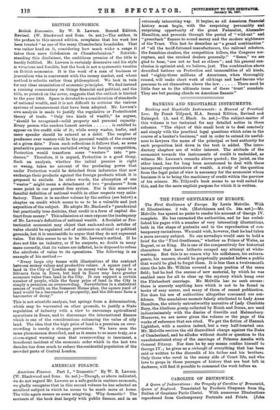BRITISH ECONOMICS.
British Economics. By W. R. Lawson. Second Edition, Revised. (W. Blackwood and Sons. Os. net.)—The author, in the preface to this second edition, complains that his work has been treated "as one of the many Chamberlain broadsides. That was rather hard on it, considering how much wider a range it takes than mere Cobdenism or Chamberlainism." Notwith- standing this disclaimer, the ambitious promise of the title is hardly fulfilled. Mr. Lawson is certainly discursive and his style is vivacious and forcible, but the book is not a systematic treatise on British economics. It is the work of a man of business or journalism who is conversant with the money market, and whose method is eclectic rather than philosophical. We look in vain for any clear enunciation of economic principles. We find instead a running commentary on things financial and political, and the title, as printed on the cover, suggests that the outlook is limited to the year 1904. Space is devoted to a consideration of standards of national wealth, and it is not difficult to criticise the various systems of measurement that have been adopted. Mr. Lawson's own analysis is made to justify the regulative or Protectionist theory of trade. "Only two kinds of wealth," he argues, "should be recognised—solid property and personal capacity.
Every person who renders honest service is entitled to appear on the credit side of it; while every waster, loafer, and mere spender should be entered as a debit. The surplus of produoers over wasters will be the personal wealth of the country at a given date." From such reflections it follows that, as some productive processes are curtailed owing to foreign competition. Protection would transform some " wasters " into "pro- ducers." Therefore, it is argued, Protection is a good thing. Such an analysis, whether the initial premiss is right or wrong, takes no account of the producing power that under Protection would be detached from industries that now exchange their products against the foreign products which it is proposed to exclude. In other words, the absorption of one "waster" might mean a detachment of two "producers" from some point in our present free system. Nor is this somewhat fanciful definition of national wealth in other respects very satis- factory. There is in another volume by the author (see below) a chapter on credit which seems to us to be a valuable and just exposition of the subject. He adopts Mr. MacLeod's "paradoxical but practically true doctrine, that credit is a form of capital dis- tinct from money." This admission at once exposes the inadequacy of Mr. Lawson's definition of national wealth. A Socialist or Pro- tectionist economist may object that such-and-such articles of value should be regulated out of existence on ethical or political grounds, but it is unscientific to argue that they do not represent value. Yet this seems to us to be Mr. Lawson's method. If he does not like an industry, or if he suspects, no doubt in many eases correctly, that its values are inflated, he is disposed to refuse the attribute of value to its operations. The following is an example of his method:— "Every large city teems with illustrations of the contrast between money values and productive values. A square yard of land in the City of London may in money value be equal to a 300-acre farm in Essex, but land in Essex may have greater economic value than land in the City. It can support a certain number of people, while the fancy price of land in the City is simply a premium on overcrowding. Nevertheless in a statistical census of wealth on the Somerset House plan, the square yard of land would be a barometer of prosperity, and the 300-acre farm a barometer of decay."
This is not scientific analysis, but springs from a determination, which may be warranted on other grounds, to justify a State regulation of industry with a view to encourage agricultural operations in Essex, and to discourage the international finance which is one of the considerations enhancing the value of city land. The idea that the high price of land is a premium on over- crowding is surely a strange perversion. We have seen the same phenomenon described, and as it seems to us more truly, as a storm-signal warning men that overcrowding is imminent, a beneficent incident of the economic order which in the last two decades has done much to reduce the residential population of the crowded parts of Central London.






















































 Previous page
Previous page